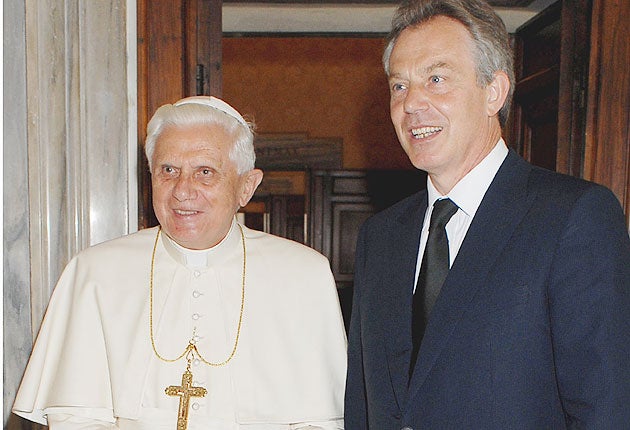Blair: Pope is wrong about gays – and most Catholics think so too
Former prime minister condemns Vatican's 'entrenched' attitudes – and proposes New Labour-style makeover

The Pope and the Vatican have an "entrenched attitude" towards homosexuality which is less tolerant than the views of ordinary Catholics, Tony Blair says in comments published today.
The former prime minister, who converted to Catholicism shortly after leaving office two years ago, said he disagreed with the Pope's stance on gay rights and controversially suggested that the Church should reform itself along similar lines to how he re-organised the Labour Party.
"Organised religions face the same dilemma as political parties when faced with changed circumstances," he said.
"You can either A: Hold on to your core vote, basically, you know, say 'Look let's not break out because if we break out we might lose what we've got, and at least we've got what we've got so let's keep it'. Or B: You say 'let's accept that the world is changing, and let us work out how we can lead that change and actually reach out'."
The comments from Mr Blair will cause controversy in the Vatican which still officially insists that gays are "intrinsically disordered" and that homosexual sex is a sin.
Last year, Pope Benedict XVI caused widespread outrage in the gay community when he compared toleration of gays to the destruction of the rainforests and said that homosexuality is "a more or less strong tendency ordered towards an intrinsic moral evil".
Mr Blair, who now runs his own religious think-tank, made the comments during an interview with The Independent columnist Johann Hari, who was writing for Attitude, Britain's biggest-selling gay magazine. Its 15th anniversary edition with Mr Blair's full interview is published today.
Asked whether he agreed with the Pope's latest remarks on homosexuality Mr Blair said he believed that ordinary Catholics did not feel the same way about homosexuality but the Church's leadership was afraid of making any major doctrinal concessions.
"There is a huge generational difference here," he said. "There's probably that same fear amongst religious leaders that if you concede ground on [homosexuality], because attitudes and thinking evolve over time, where does that end? You'd start having to rethink many, many things." He added: "If you went and asked the [ordinary Catholic] congregation, I think you'd find that their faith is not to be found in those types of entrenched attitudes."
Mr Blair's comments are controversial because since leaving office two years ago he has become a powerful unofficial ambassador for Catholicism. Although Catholicism takes a traditionally tough line against homosexual sex, Mr Blair presided over key pieces of gay equality legislation when he was in office, including the introduction of civil partnerships and lowering the age of consent for gay people to the same as for heterosexuals.
His generally liberal stance on abortion also contrasts with the Vatican, which supported the excommunication of a mother and four doctors in Brazil last month who performed a termination on a nine-year-old girl who had been raped by her stepfather.
In discussing his political approach to gay rights, Mr Blair praised the former mayor of London Ken Livingstone, who, he said, inspired him to be more determined to push through gay equality legislation.
"He changed my thinking in the sense that it taught me – or retaught me – a lesson that I think is very important in politics, which is that conventional wisdom is not necessarily wise: it can be wrong and it can be just a form of conservatism that hides behind a consensus," he said.
He also said that his long-term friend and trusted adviser, the Business Secretary Lord Mandelson, had been the victim of homophobia throughout his political career.
"His career is interesting in both senses in that he's attacked in certain quarters for being gay, and yet, at the same time, also, I don't believe that has altered in any shape or form people's opinion of him," he said.
"What those comments indicate is that the prejudice is still there, but what they also indicate is that its force is very weak, really."
Join our commenting forum
Join thought-provoking conversations, follow other Independent readers and see their replies
Comments
Bookmark popover
Removed from bookmarks